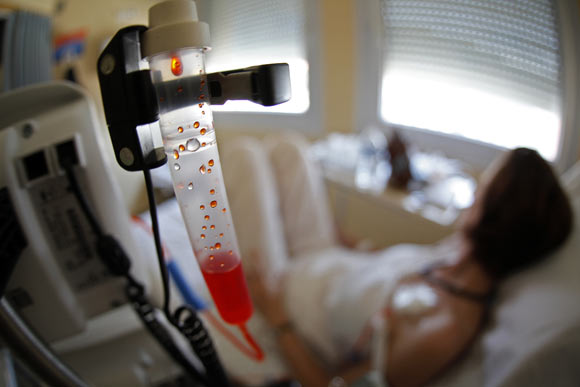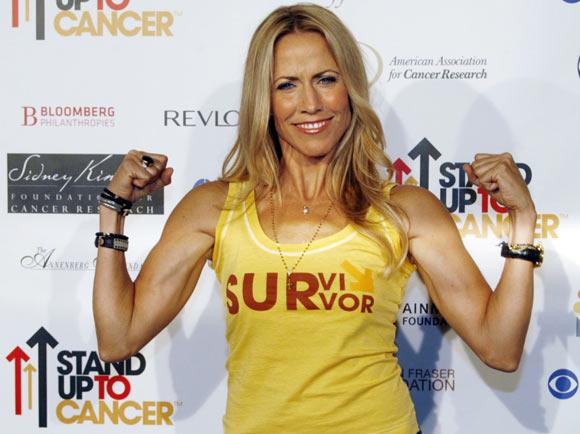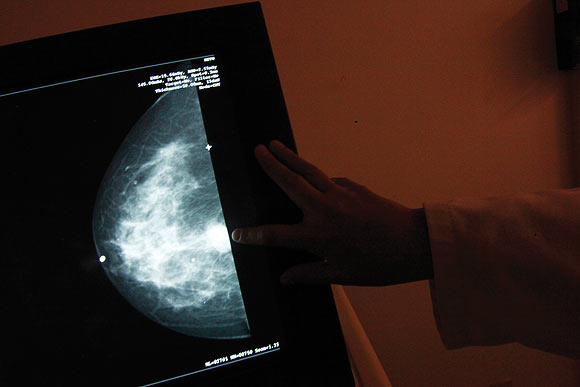 | « Back to article | Print this article |
Breast cancer: Has Angelina triggered an anxiety wave?
A doctor weighs in the fear of cancer triggered by the Hollywood star's mastectomy confession.
Sharmila works in our bank as a Relationship Manager. She is a bubbly and cheerful girl around 30 and recently married.
The other day she came to me, panic written all over her face.
"Doctor, I am terrified!!" she said and burst into tears.
I said "Why don't you just relax and tell me what's bothering you so much?"
"Doctor, my mother had breast cancer and now I am really scared that I have to undergo bilateral mastectomy (removal of both my breasts) and have implants done to reduce my risk.
Can you recommend someone??!!"
I was taken aback! I said, "Wait a minute, wait a minute, now why do you have to do this?"
She said, "Angelina Jolie has declared, that's how she has reduced her risk and I do not know where to get this genetic testing done."
What kind of panic and anxiety must be triggered amongst millions of women across the world by this dramatic revelation of a Hollywood star?
Of course, she has done this with the faith that one has to be cautions (let's assume that her PR exercise story is not true!)
I thought I would do a bit of research and give the facts to Sharmila and many other ladies who are possibly equally frightened and anxious because of this piece of news.
Is Cancer hereditary? Particularly is breast cancer hereditary? And are extreme measures like a bilateral mastectomy necessary? If so in whom?
Let's get into a bit of science on the rogue genes -- BRCA1 and BRCA 2.
They were first identified in families with breast cancer.
If just one relative has breast cancer and it is NOT a familial or hereditary breast cancer. So just a family history of breast cancer does not mean there are inheritable abnormal genes increasing risk of breast cancer.
I asked Sharmila, "Apart from your mother does any one in your family have breast cancer?"
She said, "I think my husband's aunt had some breast problem."
"No, no, your relatives by blood line like your mother, maternal grand mother, sisters, maternal aunts etc."
Sharmila said, "No, I don't think so."
"Good, then you are NOT in the super high-risk group of hereditary breast cancer. So don't worry."
Dr Jagannath is presently Chairman, Department of Surgical Oncology, Lilavati Hospital and Research Centre, and Professor of Gastrointestinal Oncology, Asian Institute of Oncology, S.L. Raheja Hospital, Mumbai from 2002. You can follow his blog here.
Breast cancer: Has Angelina triggered an anxiety wave?
When we look at the scientific data, there are three groups of women:
Familial breast cancer
Familial or hereditary breast cancer or breast ovarian cancer syndrome are defined as those families with 3-4 cases of breast +/- ovarian cancer across two generations. In these patients also, the genes BRCA1 and BRCA2 are not always responsible. 52 per cent of such cases are due to BRCA1 and 35 per cent are due to BRCA2 and the remaining are due to other genes.
This is the group where testing would be appropriate if 'they wish to'. If you don't carry a mutation you can avoid intense surveillance like 6 monthly tests.
However, the problem is, finding a BRCA1/2 does not mean that you DO get breast Cancer.
The problem of 'gene expression' and 'penetrance' compound the issue. Not all genes express and produce cancer. But, once you know that you carry the gene, the panic starts. Proportion of breast cancer cases in the general population due to BRCA1 is 5.3 per cent below age 40 years, 2.2 per cent between ages 40 and 49.
As doctors we need to be cautious in not triggering anxiety attacks and many have opted out of gene testing and rightly so.
Breast cancer: Has Angelina triggered an anxiety wave?
The second group consists of those who are diagnosed as having breast cancer.
What is the impact of genetic testing and is it mandatory to do genetic testing?
Not necessary at all. The reason is that a random genetic testing for any cancer would not really show a mutation.
Fundamentally there are two types of cancers (1) Familial or hereditary (related to abnormalities in genes) and (2) Sporadic or a random occurrence of the disease.
Sporadic or random occurrence of the disease is most common (90-95 per cent) and may not be associated with any gene mutation. The easiest way to identify a genetic mutation causing hereditary cancer is that the family should have more than 3 to 4 members having the disease.
So even those patients who are newly diagnosed with cancer, unless there is a strong family history, need not panic into a genetic testing routinely.
Breast cancer: Has Angelina triggered an anxiety wave?
The third group consists of those who have relatives diagnosed with breast cancer.
They have absolutely NO need for genetic testing unless there is a strong family history like group one or certain communities. Most -- nearly 95 per cent fall in this category.
I assured Sharmila, "you may have a relative just diagnosed with cancer or treated for cancer but there is absolutely no need to panic." There is 5-10 per cent increase in incidence due to family history. As you are now aware and likely to go for screening periodically, rest assured you will be SAFE.
I think Angelina Jolie has caused more anxiety than help to women. Indeed in a sporadic mutation responsible for 95 per cent of breast cancer, the risk is overstated and certainly does not warrant bilateral mastectomy in a young age. In fact the risk in BRCA 2 is 29 per cent by 50 years of age and 88 per cent by 70 years!! BRCA1 carries a higher risk.
There is always risk in life. There is risk in life of not only relating to cancer but also to cardiac and other illnesses. Every organ can have malignancy. Does it mean that one should sacrifice all the organs? Or worst still, have all the genes allegedly responsible for all diseases tested? Is there a simpler way of managing?
How is Angelina going to manage the risk of ovarian cancer? Her ovaries are still preserved!!
Breast cancer: Has Angelina triggered an anxiety wave?
The best way is obviously a more intensive screening of those at high risk rather than putting them to genetic testing. And for all you know if only 52 per cent of the familial cancers had BRCA1 mutation and the rest did not have BRCA1 mutation. The presence of genetic mutations do not always manifest in "C" in every individual. There has to be some caution but definitely don't rush into something as traumatic as bilateral breast removal with its attendant risks and problems.
One has to realise that science is never perfect and new knowledge may be totally different from existing information.
Sharmila smiled, convinced that panic is the last reaction in fighting the Big C.
So defeat your fear and you can prevent cancer, particularly breast cancer.
She was curious to know about the genes and cancer. And I promised that I would talk on "Cancer" and "what is the role of genes".
My take:
I personally don't think Angelina did this as a PR exercise. It's too traumatic and risky to undergo prophylactic bilateral mastectomy for publicity. Not for her any way. So many have undergone bilateral mastectomy and kept quiet.
But the timing should have been better to avoid a controversy on the pending legal issue on patenting BRCA1/2 genes. I do hope there was no hidden agenda. Certainly she should not promote genetic testing for all those with a relative.
Patenting genes is ridiculous. Hope the US Supreme Court takes the right decision.
References:
1.Estimates of the gene frequency of BRCA1 and its contribution to breast and ovarian cancer incidence. D Ford, D F Easton, and J Peto, Am J Hum Genet. 1995 December; 57(6): 1457�.
2.Genetic testing for familial/hereditary breast cancer—comparison of guidelines and recommendations from the UK, France, the Netherlands and Germany D. Gadzicki & D. G Evans& H Harris et al: J Community Genet (2011) 2:53




